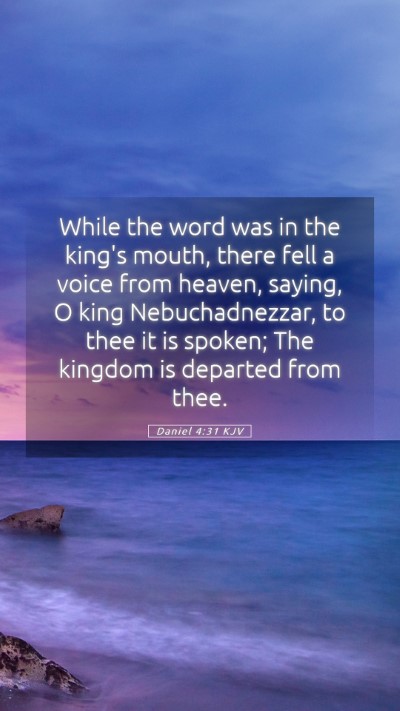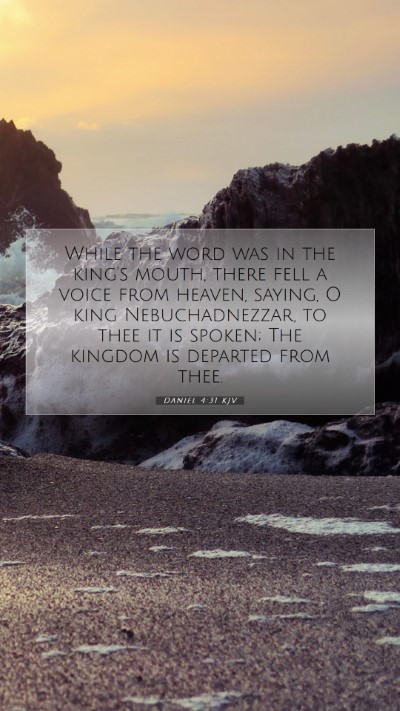Understanding Daniel 4:31
The verse Daniel 4:31 reads:
“While the word was in the king’s mouth, there fell a voice from heaven, saying, O King Nebuchadnezzar, to thee it is spoken; The kingdom is departed from thee.”
Summary and Interpretation
This pivotal moment in Daniel 4 depicts a dramatic interaction between God and King Nebuchadnezzar of Babylon. The king, having experienced a moment of pride and self-exaltation, receives a divine pronouncement that leads to his downfall. Together, public domain commentaries provide insights that enhance our understanding of this moment’s significance.
Insights from Commentaries
-
Matthew Henry Commentary:
Matthew Henry emphasizes the suddenness of God's judgment. The king’s words had not yet left his mouth when the decree was enacted. This highlights God's sovereignty and the seriousness of pride in one's heart. Henry suggests that humility before God is crucial, and the sudden divine response serves as a warning against arrogance.
-
Albert Barnes' Notes:
Barnes points out that this moment captures the essence of God's authority over human kings and kingdoms. He interprets the voice from heaven as a clear indication of divine intervention in human affairs. Barnes notes that God’s judgment on Nebuchadnezzar serves as a lesson on the fleeting nature of earthly power and the inevitability of divine retribution for pride.
-
Adam Clarke's Commentary:
Clarke expands on the dramatic elements of the story, noting that Nebuchadnezzar's state of mind just before the pronouncement reflects his divorce from humility. He explains how this particular episode illustrates the connection between sin, especially pride, and punishment. Clarke contextualizes this by referring to the historical account of Nebuchadnezzar's reign and personal characteristics.
Application of the Verse
This verse holds contemporary relevance as it underscores the timeless principle that pride comes before a fall (Proverbs 16:18). Believers today can reflect on the implications of humility and the need for dependence on God. Furthermore, the story of Nebuchadnezzar reminds us to avoid self-glorification and recognize the sovereignty of God in all aspects of life.
Related Bible Cross References
- Proverbs 16:18: "Pride goes before destruction, and a haughty spirit before a fall."
- James 4:6: "But he gives more grace. Therefore it says, 'God opposes the proud but gives grace to the humble.'"
- Isaiah 14:12-15: A passage discussing the fall of Lucifer and pride, drawing parallels with Nebuchadnezzar's prideful fall.
- 1 Peter 5:5: "Clothe yourselves, all of you, with humility toward one another, for God opposes the proud but gives grace to the humble."
- Daniel 5:20: This verse illustrates a continuation of the theme of pride leading to downfall, as seen in King Belshazzar's life.
Importance of Bible Study
Engaging with scriptures like Daniel 4:31 through various Bible study tools and Bible study resources can significantly enhance Bible verse understanding. Utilizing Bible study guides and participating in Bible study groups can further demystify difficult passages and provide personal application insights.
Conclusion
The study of Daniel 4:31 reveals profound truths about the nature of pride and God's authoritative voice in our lives. By exploring various commentaries and engaging with the text through prayerful reading and discussion, one gains deeper Bible verse explanations and can better appreciate how such stories convey spiritual lessons relevant to our faith journey today.


